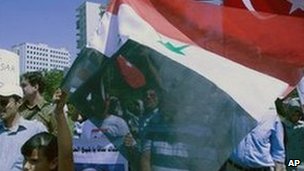 Turkish Foreign Minister Ahmet Davutoglu is in Syria to demand an end to a crackdown on protests by President Bashar al-Assad's government.
Turkish Foreign Minister Ahmet Davutoglu is in Syria to demand an end to a crackdown on protests by President Bashar al-Assad's government.
Turkish PM Recep Tayyip Erdogan has said he is running out of patience over "the savagery" of Syria's security forces towards protesters.
Saudi Arabia, Kuwait and Bahrain have all recalled their envoys to Damascus.
Tanks attacked Binnish in the Syrian province of Idlib, bordering Turkey, witnesses and rights activists said.
Reports also suggested an armoured column again entered the eastern city of Deir al-Zour in the third day of an army offensive there. At least 50 people died in the city on Sunday after the army launched a pre-dawn assault.
Activists said that as in recent days, many people had been afraid to leave their homes or take injured people to hospital for fear of being attacked.
Syrian state TV has reported that Mr Assad has appointed a new minister of defence, former army chief of staff Gen Dawoud Rajha. He replaces Gen Ali Habib, said the report.
Access to Syria has been severely restricted for international journalists, and it is rarely possible to verify accounts by witnesses and activists.
Human rights activists say at least 1,700 civilians have been killed and tens of thousands arrested since the uprising began in mid-March. More than 300 people are believed to have died in the past week alone.
'Burning anger'
The Syrian crackdown continued on Tuesday, with the Syrian Observatory of Human Rights reporting two civilians killed in Idlib province. It said two more died in Hama, scene of previous heavy assaults, after a reported 14 died on Monday, mostly in Deir al-Zour.
It said the area of Sarmin was also under attack.
Asked why Binnish was stormed, a resident who had fled Binnish told Reuters news agency: "The whole town has been joining in night rallies after Ramadan prayers."
The deployments in Idlib come on Turkey's doorstep just as Mr Davutoglu was sent to Syria to urge a halt to the crackdown.
Prime Minister Erdogan delivered a tough message over the weekend, not just saying he had run out of patience but pointing out that from Turkey's point of view the Syrian crisis was almost an internal problem of Turkey - their shared border is over 800km (500 miles) long, says the BBC's Jonathan Head in Istanbul.
Their trade has become very entwined, especially on the border region, over the last 10 years.
Turkey's constituents - many of them Sunni Muslims - sympathise with protesters in the neighbouring country, many of whom are also Sunni Muslim - and there is burning anger in Turkey at what is happening to them, our correspondent says.
Mr Davutoglu may threaten Turkish support for stronger action by the UN Security Council, although few believe he will have much success.
President Assad's spokeswoman has already warned of an equally tough reply from Damascus.
But our correspondent says that there is no suggestion yet that Ankara will downgrade its diplomatic ties, or impose economic sanctions.
In a statement over the weekend, King Abdullah of Saudi Arabia said the events in Syria were "unacceptable", and that Damascus had to choose between "wisdom" or being "pulled down into the depths of chaos and loss".
The BBC's Jim Muir in Beirut says that by Arab diplomatic standards, it was a highly dramatic intervention by the Saudi monarch, one of the most influential powers in the region.
King Abdullah said he had recalled his ambassador from Damascus for consultation. That move was followed by Kuwait and then Bahrain.
On Monday the Arab League's head, Nabil al-Arabi, said he hoped the crisis could be overcome "by peaceful means and by launching a serious dialogue towards the reconciliation that the people have been demanding".
Meanwhile the top Sunni Muslim authority, Cairo-based al-Azhar, said the situation in Syria had "gone too far".
The US State Department has said it is "very much encouraged by the strong statements" from the region.
Damascus says it is tackling "armed terrorist gangs" and that its critics have ignored its promises of political reform.



